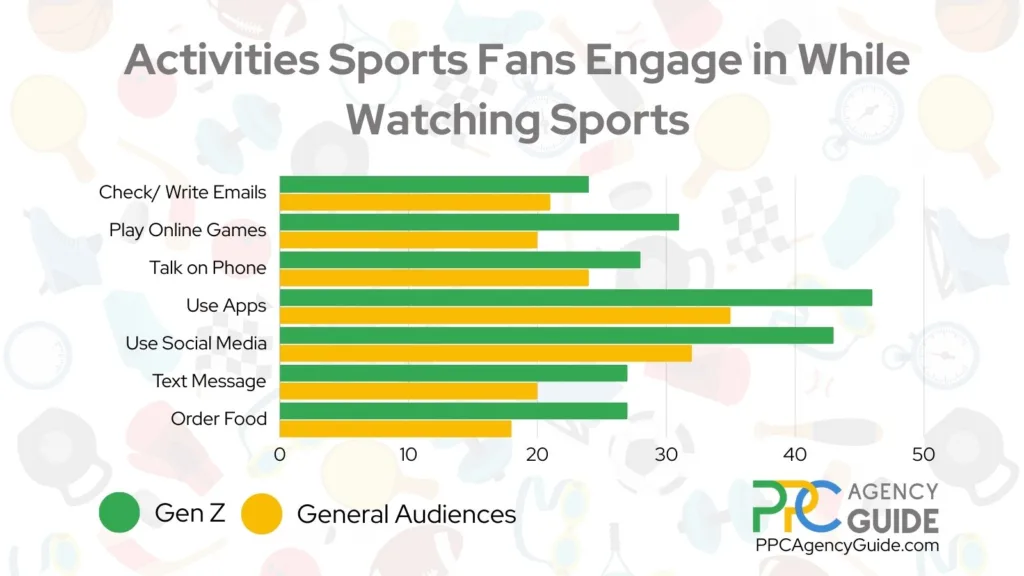
Over three-quarters of adults globally are now sports fans, YouGov research shows. If you’re trying to expand your audience, sports event pay-per-click (PPC) strategies are tough to beat. But, getting a return on investment (ROI) on sports event PPC isn’t always easy. We’ll walk you through some event-driven PPC techniques to help you score big on this page.
Building Brand Loyalty Through Sports Sponsorships
Sponsoring sports teams and events is a powerful marketing strategy that can significantly boost brand loyalty. When your brand supports a sports team, you create an emotional connection with the fans, increasing purchase intent and loyalty. Nielsen reports that sponsorship can boost purchase intent by up to 10%. Successful sports sponsorship campaigns involve integrating your brand with the team’s values and activities, making your brand a part of the sports community. This connection helps in building trust and credibility among fans.
To maximize the benefits of sports sponsorships, leverage various digital marketing strategies. Use PPC ads and social media platforms like Twitter and Instagram to promote your sponsorship. Highlight your involvement in the sports industry through content marketing, sharing behind-the-scenes content, interviews with players, and exclusive offers for fans. Incorporate elements like good ad copy and retargeting to ensure maximum engagement. Drive traffic to your website by including a “contact us today” call-to-action in your campaigns.
1. Know Your Values
Sponsoring a team can boost purchase intent by ten percent, Nielsen reports. Sponsors routinely receive special perks, such as permission to use team trademarks. These aspects can boost your PPC results dramatically, but bear in mind that sports fans form tight-knit communities of their own. They’re hyper-aware of who belongs and who doesn’t, and rivalries are intense. This makes digital marketing for sports fans distinct from any other type of campaign.
If you plan to support a specific team or athlete, make sure you’re committed to standing behind them and prepared for backlash from the opposition. You’ll win preference and loyalty from “your” team, but it will likely cost you business from competing teams. An alternative approach is to sponsor an arena or game. It can help boost brand awareness, though it’s unlikely to produce the same solidarity you’ll see by sponsoring a team.
Whatever path you choose, incorporate it into your brand values and make it part of your company ethos. It will make your campaigns more authentic and help them perform better.
2. Align Your Campaigns
Standalone PPC campaigns can perform well. However, most brands leveraging sports events for marketing tend to run many types of campaigns. For instance, you may have TV, radio, social media, and SEO activities all surrounding a single sporting event. If your brand leverages this approach, you’ll get better results if messaging is consistent across all channels.
Create a Marketing Brief
Develop a marketing brief to share with everyone working on your campaign. It should include:
- Overview of the company and its values
- Purpose of the campaign
- Campaign objectives and strategy
- Target audience
- Deliverables
- Relevant channels
- Keywords and hashtags
- Schedule
- Total budget and budget by channel
- Names and contact details of people involved
3. Consider Your Goals and the Best Metrics to Track
Most brands leveraging ad campaigns for sports tournaments are focused on building brand awareness or recognition. This is the first time people hear your name and may not even be looking for your products or services. If this is the case for your brand, simply tracking engagement, subscriptions to your newsletter, or similar metrics may be sufficient.
However, your goals may be different. For instance, if you’re selling licensed merchandise or operating a business close to a live event, you may want to focus more on sales or foot traffic. It may make more sense to track total sales/ orders placed, sales volume, or ROI.
4. Select the Ideal Timeframe
PPC optimization for sports seasons differs from managing online advertising during individual sports matches. Make sure you nail down your timeframe early to ensure your budget is applied effectively.
For instance, if you’re running a single campaign before a game, you may want to start a few weeks ahead, ramp up advertising just before the game, and be prepared to maintain high levels or decrease spend depending on the outcome. A similar approach can be leveraged for sports seasons, though spending fluctuates less.
5. Target the Right Audience
Cost-effective real-time bidding for sports events hinges upon targeting the right audience. Platforms like Google Ads and Microsoft Advertising offer affinity audience targeting, which allows you to zero in on fans of specific sports. It may be worth testing these broad audiences to see if they’re effective for your brand. However, you can run much more targeted ads for sporting events.
Create Custom Segments
Google Ads, among others, allows you to target specific audiences based on specific interests and sites or apps they’ve visited.
Keywords
Reach people who have run searches for specific keywords of your choosing or people with interest or purchase intent that relates to specific keywords. For instance, someone searching for “Super Bowl time” is likely a fan intending to watch the game. Equally, someone searching for “49ers jersey” may well be a 49ers fan that you can target with other 49ers merch or team-related advertising.
URL
Reach people who have visited sites similar to your inputs. For instance, you might add “www.manutd.com” to your list if you’re hoping to reach Manchester United fans.
Apps
Reach people who download and use apps similar to your inputs. For example, you might add “Toronto Maple Leafs,” the official hockey team app.
Target by Location
Virtually all PPC campaigns should include targeting by location. Deep geotargeting is preferred if you’re trying to reach people attending a live event. Let’s review a few examples.
Zip Code/ Postcode
Let’s say you want to reach people who are attending a live Manchester United game. Rather than geotargeting Manchester, the location of Old Trafford Stadium, you might enter the stadium’s postcode “M16.” It drops the local population down to under 36,000, compared to 2.8 million in Manchester.
University
Perhaps your team plays at a local university. For instance, the Ohio State football team plays at Ohio Stadium on the Ohio State University campus. You can use targeting to zero in on “Ohio State University” and only reach people on campus.
6. Be on the Right Platforms and Select the Best Formats
Engaging sports audiences with PPC is easier than you might think, even during games. Neilsen reports that nearly half of all sports fans alternate between screens while watching a game. Not surprisingly, younger generations are more likely to multitask.
This means mobile ads can be quite successful, especially if you’re meeting them where they are. For instance, display ads in apps are likely a strong bet, followed closely by social media. For example, X (Twitter) and Facebook tend to be hotspots.

7. Choose Keywords Mindfully
Selecting keywords for a sports event isn’t remarkably different from traditional keyword selection. However, you’ll want to be especially mindful if you’re targeting live in-person audiences and trying to increase foot traffic or sales to a local business. Your audience may not know the area they’re in, so they’re more likely to search using landmarks or with voice search.
For instance, someone planning a visit to attend Super Bowl LVIII is more likely to search for “hotels near Allegiant Stadium” than “Las Vegas hotels.”
A person leaving the stadium and looking for food will likely use voice search in their car. Rather than using a typed search of “pizza near Allegiant Stadium,” the searcher will use natural language and perhaps pose a question such as, “Where’s the closest pizza place to Allegiant Stadium?”
It’s essential to consider your audience, goals, location, and technology as you define your keyword strategy because of this.
8. Speak Their Language

If you can do so with authenticity, try to speak like your audience does in your ad copy and on landing pages. For instance, phrases like “Red Devils” and “Reds” would likely be at home in ads targeting Manchester United fans. Because you’re speaking like they do and calling them by name, they’re more likely to take notice of your ad and click if it’s relevant to them.
9. Use Scarcity and Exclusivity as Appropriate
As you home in conversion strategies for sports events, experiment with scarcity and exclusivity in your ads. For instance, you can offer a game day discount, special pricing during a match, or discounts for people who prove they’re fans by wearing a jersey or showing a ticket stub. These approaches often boost conversions, provided your targeting is spot-on.
10. Leverage Extensions
If you’re running seasonal PPC for athletic events, don’t forget to include extensions in your search ads. Be creative and think beyond the types of extensions you might generally run. For instance, if you sponsor a team, consider creating a landing page that details your sponsorship and include it as an extension. If you’re trying to increase foot traffic, offer directions from the stadium to your location. Google will test your extensions and run the most effective ones, so try multiple angles to see what boosts your clicks.
11. Be Mindful of Ethical and Compliance Considerations
Most teams, leagues, and major sports events have trademarked names, slogans, and logos. For the most part, this means you cannot legally use them at all. Some ad platforms will catch that you’re using them and flag your ads, while others won’t. Your ability to upload an ad containing a phrase or image should not be taken to mean it’s allowed. You can still be sued or penalized for it. Because of this, it’s usually better to work with phrases you know are not trademarked. For instance, many brands use the phrase “Big Game” instead of “Super Bowl.”
You may receive special permission to use trademarks if you sponsor a team or event. Read your contract carefully to determine what’s allowed and what isn’t.
12. Track and Analyze the Performance of Sports Event-Related PPC Campaigns
Always set aside time after running sports-themed ad campaigns to measure your success based on the metrics you selected before you began your campaigns. You’ll also want to set aside time during longer or high-volume campaigns to make adjustments. For instance, if your campaign runs an entire season, you’ll want to check performance and adjust keywords at least once per week.
Post-Event Analysis and Follow-Up
Analyzing PPC Campaign Performance
The post-event analysis is crucial for understanding the success of your PPC campaigns and making data-driven decisions for future events. Use tools like Google Analytics to track key metrics such as click-through rates, conversion rates, and ROI. Analyze which keywords, ads, and targeting strategies performed best and identify areas for improvement.
Consider conducting A/B testing on different ad variations to see which resonates most with your audience. Use the insights gained from your analysis to refine your PPC strategies and improve future campaign performance. Contact us today for expert guidance on analyzing your PPC campaign performance and optimizing your strategies for future events.
Strategies for Post-Event Engagement
Post-event engagement is essential for maintaining the momentum and continuing the conversation with fans. Share post-event content such as highlight reels, behind-the-scenes footage, and exclusive interviews on social media platforms like Twitter and Instagram. This type of content marketing can keep your audience engaged and interested in future events.
Implement remarketing strategies to re-engage users who attended the event or interacted with your ads. Use email campaigns to thank attendees, share post-event highlights, and promote upcoming events. By staying connected with your audience and providing valuable content, you can improve brand loyalty and drive traffic to your site. Contact us today to learn more about effective post-event engagement strategies.
Get Help Improving Your Sports Event PPC Strategies
PPC for sports events is unique. Even if you’re successfully running PPC campaigns for your business, tailoring them to events creates another layer of complexity. However, those who create strong strategies, accurately deploy campaigns, and optimize effectively can achieve incredible results. We’re happy to match you with an experienced PPC agency that understands sports PPC and is familiar with your industry to help ensure you receive top ROI. To learn more or get started, request a complimentary consultation.


















